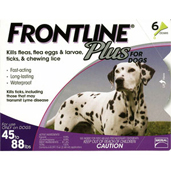When planning a trip, dog owners have
to choose between leaving their pets at home or bringing the canine
members of the family along. Traveling with pets can get a little
complicated, but with preparation it can be an enjoyable experience
for all involved.
Motion Sickness and Anxiety
Travel is exciting, but for pets it
can also be anxiety-inducing. If you have never traveled with
your dog before, be prepared to deal with the issues that commonly arise. Motion sickness is a frequent problem for dogs whether they
travel by car, airplane, boat or train. Several over-the-counter
motion sickness remedies like diphenhydramine and homeopathic Travel Anxiety Drops are available along with prescription options like Cerenia.
Consider taking a trial
run or two on winding roads to see if these products keep your pet sufficiently
comfortable. If not, your veterinarian can prescribe a stronger
medication. If your pet gets nervous in the car or in new
situations, having a product with you that helps relieve anxiety can also be a real vacation saver.
"Update your dog's identification tags and microchip information before leaving on a trip. Include your cell phone number so that you can be contacted even if your dog escapes while you are away from home."
Sometimes when a dog becomes anxious
he will stop eating and drinking and may develop diarrhea. Bring
along your pet's regular food and treats from home so that he does
not have to deal with a diet change on top of everything else. Nutritional supplements are a safe way to treat mild cases of diarrhea.
Include a few doses in a first
aid kit that you pack along
with you. If your pet has a history of stress-induced diarrhea,
your veterinarian may be willing prescribe some anti-diarrheal medications
before you leave.
Make sure you are able to get your
dog out to relieve himself every few hours. Not only will this
reduce the chance of an accident happening, but the exercise will also
help keep him from getting too antsy. Be prepared to clean up
after your pet. Plastic bags, spray cleaner and paper towels can
come in handy in a variety of situations. Consider covering your
car seats with old blankets, towels or covers designed specifically
for this purpose so that hair and other messes don't cause permanent
damage to your upholstery.
Traveling To Different Climates

Even if fleas, ticks and heartworms
are not big problems in your home town, you could very well be traveling
to a location where they are. Remember, hotel rooms can harbor
fleas year-round, and it takes just one bite from a heartworm-infected
mosquito to transmit this potentially fatal disease to your dog.
Talk to your veterinarian about starting a heartworm
preventative if your dog is not already on one of these medications. Safe and effective flea and tick preventatives are readily available. Your vet can
also help you pick the right one for your dog.
Cold temperatures pose the risk of
hypothermia if you don't adequately protect your dog. Keep him
indoors with you whenever possible, and consider purchasing a sweater
and booties or an insulated dog house if the conditions outside are
extreme. Make sure that he has adequate access to unfrozen water.
Hot temperatures can be just as dangerous
as cold. Never leave your dog alone in the car. Keeping
the windows open risks him escaping, and closing the windows at all
can cause heat to build up to dangerous levels even if the outside temperature
is relatively mild. Make sure your dog has adequate access to
clean water and shade to help him cool down when necessary.
Restraint and Identification
Update your dog's identification
tags and microchip information before leaving on a trip. If you
will be traveling with a cell phone, include this number so that you
can be contacted even if your dog escapes while you are away from home.
Make sure your dog wears a well-fitted collar or harness that he cannot
slip out of, and walk him on a sturdy leash.
Smaller dogs are often safest and most
comfortable if they travel in a crate or carrier, and they have the added benefit
of keeping pets away from the driver. Car accidents can be just
as dangerous to dogs as they are to people. If you cannot use
a crate, consider fitting your pet with a canine seatbelt to keep him
safe just in case the unforeseeable happens.
The above is provided for information purposes only and should not be used for the diagnosis or treatment of any condition.
This information does not cover all possible variables, conditions, reactions, or risks relating to any topic, medication, or product and should not
be considered complete. Certain products or medications may have risks and you should always consult your local veterinarian concerning the treatment of
your pet. Any trademarks are the property of their respective owners.